what the inmigrants need to be health under strees
Conversations about caring for parents generally brainstorm afterward in life. Withal, most children of immigrants care beyond generations and life stages. Every bit the United States is a nation of immigrants —where immigrants comprise one-eighth of the U.South. population and children of immigrants correspond one in four children in the country — it is of import to empathise the enormous barriers that immigrants and their children face when trying to access mental health care in the United States.
The daily struggles of being an immigrant in the U.Southward. are a burden both to immigrant parents and their children
These very barriers have been exposed and exacerbated by the COVID-xix pandemic, compounding mental health problems for many of these children as financial and wellness trauma worsens and access to social support is limited. The generational furnishings of social inequities in this population demand policy reform and targeted support. While the children of immigrants may not accept to endure the traumas of migration their parents experienced, the fiscal, cultural, and emotional caregiving responsibilities they assume for their parents nevertheless verbal an enormous toll on their mental well-being. The daily struggles of being an immigrant in the U.S. are a burden both to immigrant parents and their children.
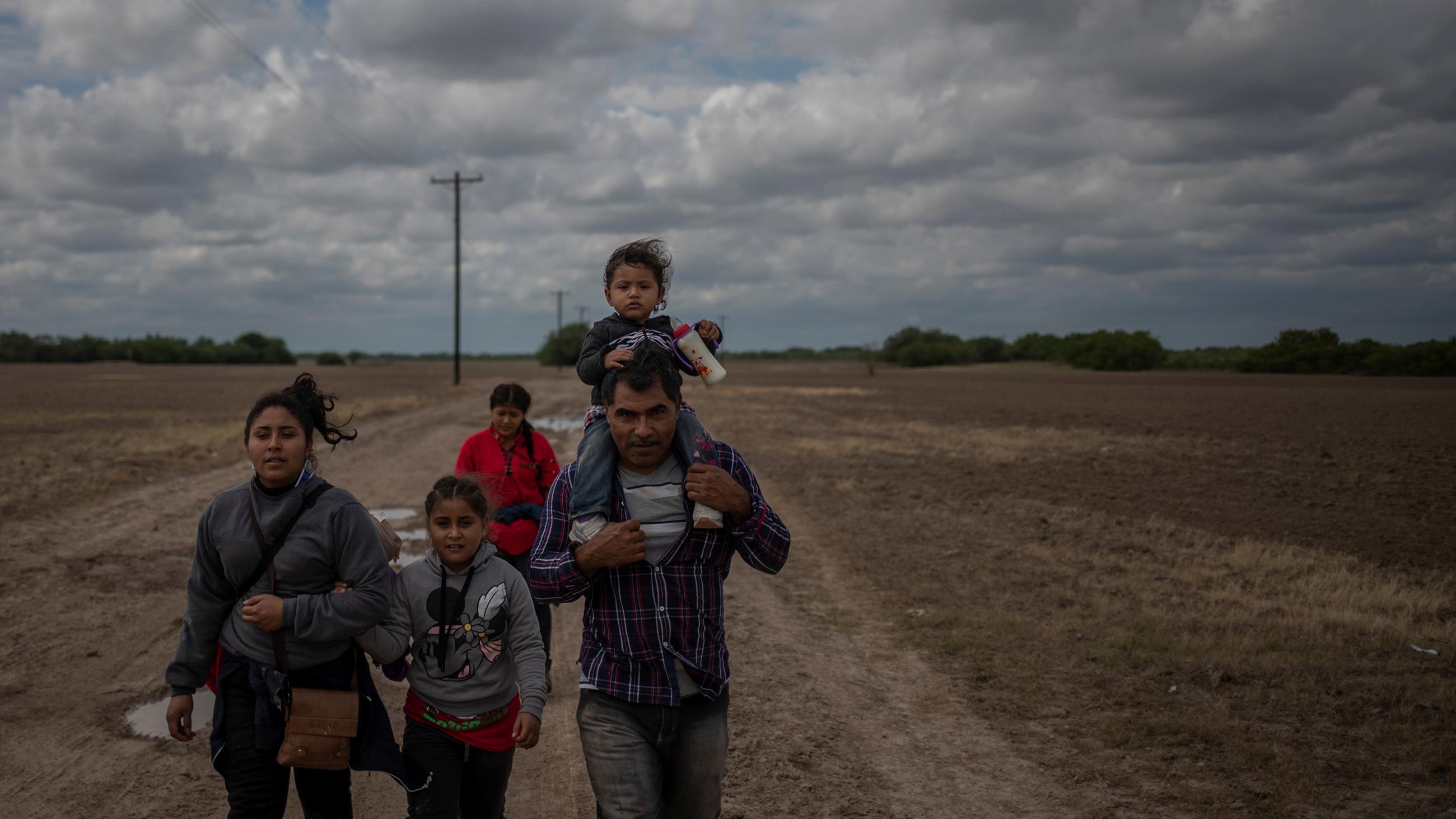
A family from Guatemala seeking asylum, walks northbound through farmland after traveling across the Rio Grande river into the United States from Mexico, near Penitas, Texas, U.S., March 22, 2019. REUTERS/Adrees Latif
Children of immigrants often financially and emotionally support their parents during difficult situations in an unforgiving U.S. organisation that leaves them without a federally mandated living wage, accessible health care, and affordable housing. They often serve as cultural and language brokers for their families' collective survival at habitation and at work. Parents besides oft set up loftier expectations on their children to succeed, given their own incredible sacrifices, including migration. And so the children of immigrants often feel an incredible pressure to drag their families and themselves to a improve life with limited or nonexistent support from the state.
Children of Asian, Pacific Island, and Latinx immigrants accept significantly higherrates of depression, anxiety, and post-traumatic stress disorder
This multifaceted identity of caretaker/child increases anxiety, stress, and low in children of immigrants compared to their parents. In fact, the prevalence of psychological distress (defined as feeling nervous, hopeless, restless or fidgety, worthless, depressed, and/or that everything was an effort) of children of immigrants is nearly double (10.ane percent) that of their first-generation immigrant parents (5.9 percent). These bug vary by ethnicity and gender—and especially by race, financial condition, and familial legal status. The vast majority of new immigrants to the U.s. are people of color, and both children and parents must navigate structural and explicit racism in the United States. The children of Asian Americans, Pacific Islanders, and Latinx immigrants accept significantly higher rates of low , anxiety, and mail service-traumatic stress disorder compared to the children of white European immigrants.
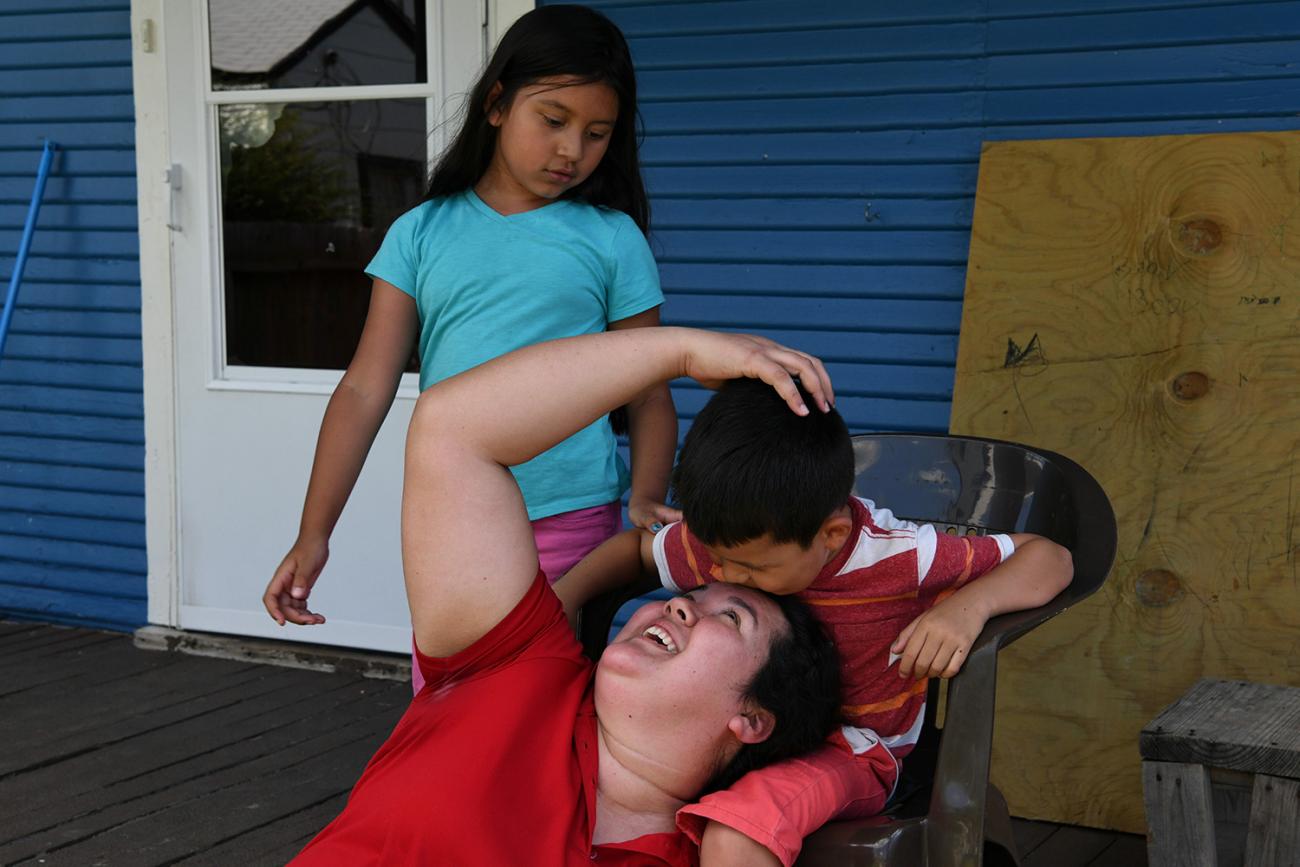
Irma Rivera, an asylum-seeker from Honduras, with her children Jesus and Suany in Fort Worth, Texas, on June 6, 2019. Happy scenes like this confute the burden of depression in children of immigrants. REUTERS/Loren Elliott
Complexity of the Problem
Immigration itself is complicated, presenting unique and dynamic repercussions for individuals and families. The hardships of immigrant parents in one generation, experienced through social inequality and cultural barriers, influence the struggles and successes of the next generation. The passage of parental hardship from immigrants to their children leaves the latter especially susceptible to mental wellness issues, peculiarly during the pandemic.
The pressures of caregiving tin can lead straight to mental wellness conditions in those children
Immigrants to the United States exercise not receive coordinated support as they integrate and build lives in the land. Religious groups and not-profit organizations provide assistance to immigrants and their families, but the demand for resources is often generational and the assist insufficient to run across complicated needs. That leaves the children of immigrants to fill the support roles essential to the social, financial, and emotional well being of their parents, specially for the more than 5.5 million American-born children of undocumented parents. The pressures of caregiving tin can then lead directly to mental health conditions in those children.
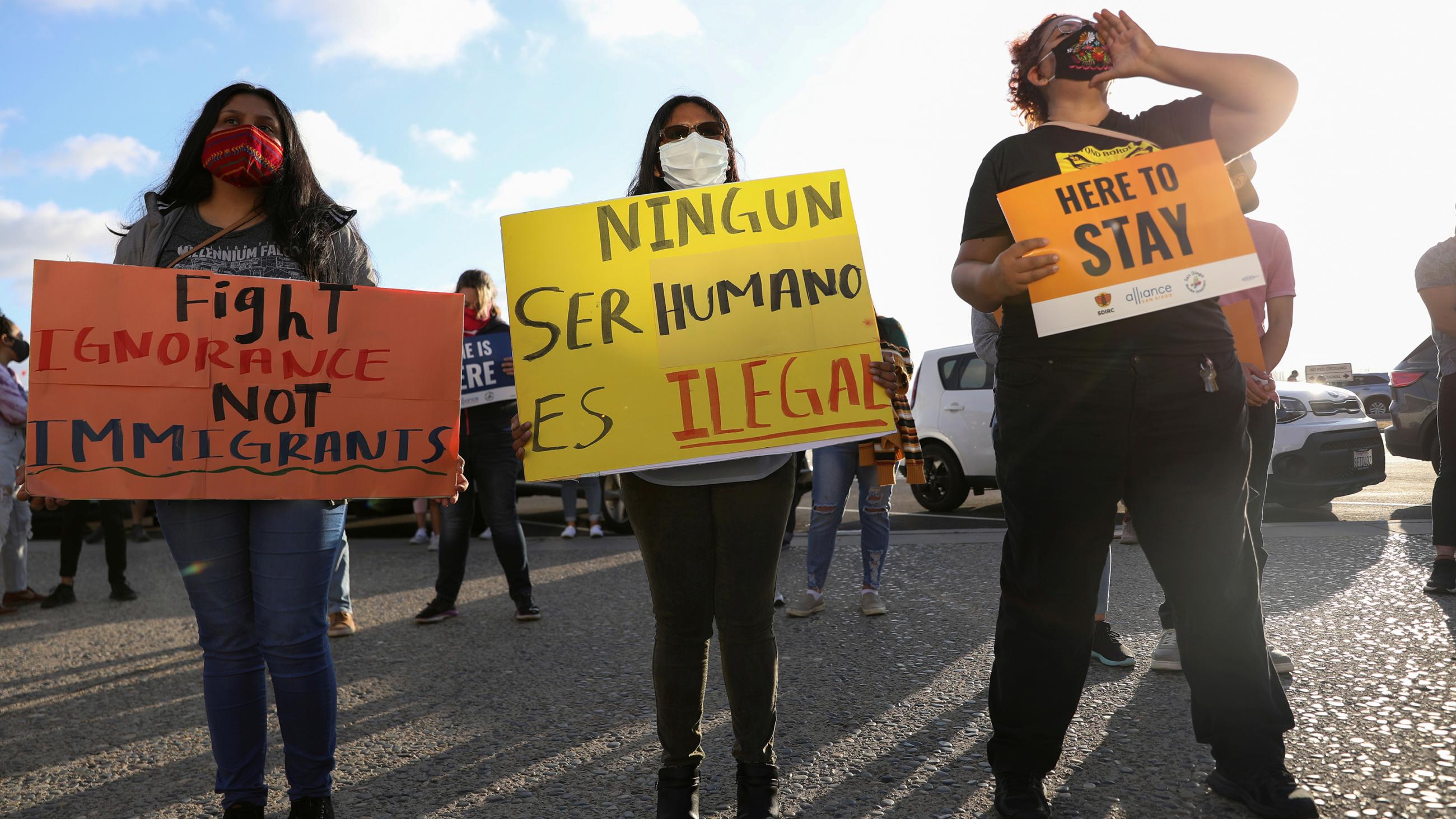
People hold signs as they take role in a rally for "Justice Everywhere" to celebrate a U.S. Supreme Court ruling on a federal clearing program, in San Diego, California, U.S., June eighteen, 2020. REUTERS/Mike Blake
Immigrants and their children and then face fiscal, logistical, and cultural challenges when accessing intendance. These challenges are an insurmountable bulwark to many who worry almost plush doctor's visits and subsequent medical interventions, and the barriers they create go on people from accessing care and contribute to poor health outcomes. Co-ordinate to a Kaiser Family Foundation analysis , roughly 23 percent of lawfully present immigrants and 45 percent of undocumented immigrants are uninsured. Moreover, about one quarter ( 11.iii million individuals ) of the U.S. foreign-born population is undocumented , leaving them ineligible for Medicaid or government benefits and nervous well-nigh the implications on their living situations should they seek coverage.
one Quarter
About one quarter (11.iii meg individuals) of the U.S. foreign-born population is undocumented
Cultural barriers also hinder children of immigrants from acquiring needed support. Many communities are uninformed about their options for formal, affordable mental wellness care. Children of immigrants may hold misconceptions about care, confront stigma for needing support, and struggle to comprehend availability of and admission to resources. Cultural traditions of privacy, proud self-reliance, a preference for not-Western medicine, and uneasiness with American wellness care exit sure immigrants less probable to seek care on their own. Moreover, many children of immigrants believe that their mental wellness needs cannot or should not be validated as their trauma seems little compared to what their parents went through. Ofttimes, children of immigrants are experiencing a full-blown mental health crisis past the time they seek care, which complicates treatment. Despite their rise to run into the multifaceted challenges of caregiving for their parents, the children of immigrants rarely seek aid for themselves by obtaining professional mental wellness care to manage this stress.
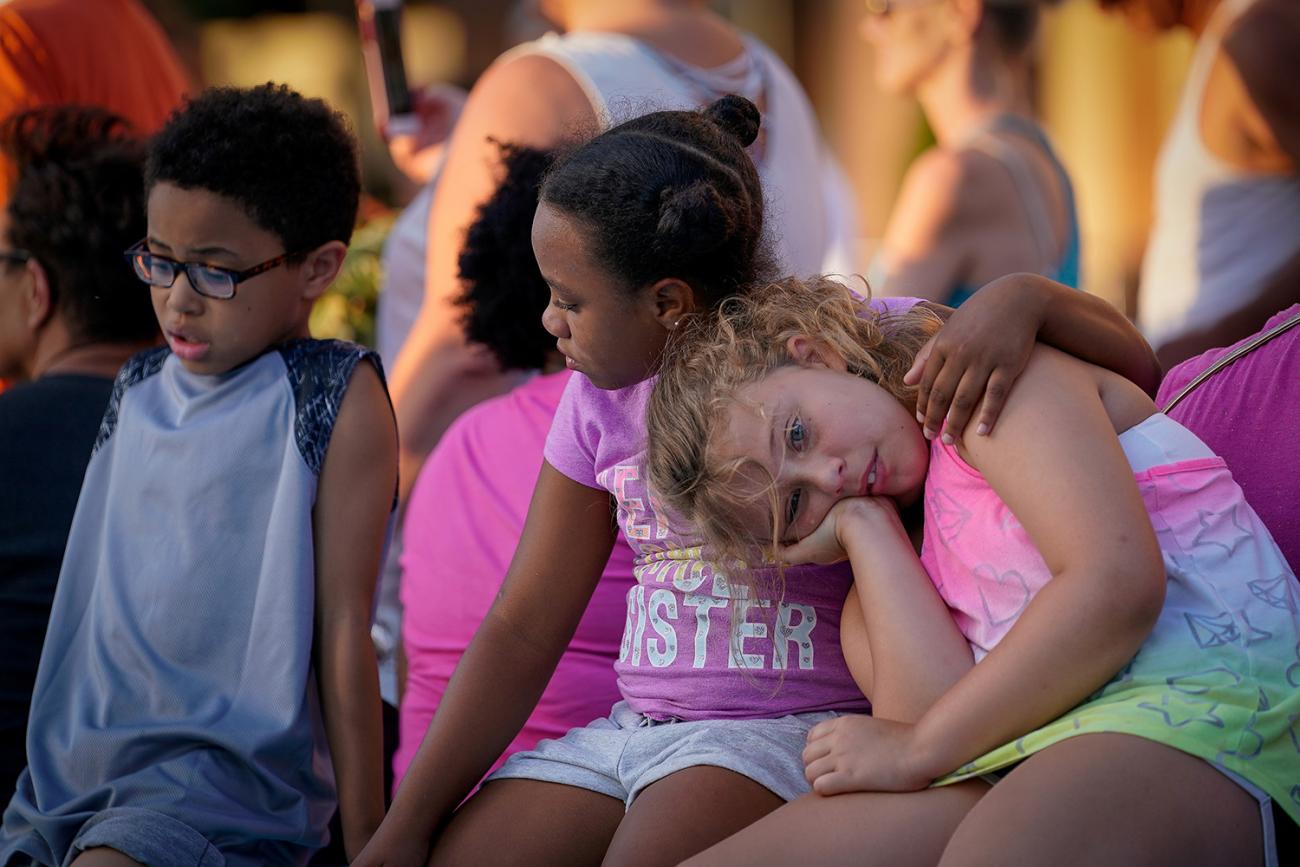
Children frequently assist family members but rarely seek mental health assistance for themselves—and may not experience the aforementioned support as these children at a memorial service in Springfield, Ohio, on August 5, 2019. REUTERS/Bryan Woolston
Heightened Challenges due to the COVID-19 Pandemic
During the COVID-19 pandemic, immigrant families have faced heightened difficulties with their concrete and mental health, which underscores the need for expanded support and targeted intervention.
Reluctant to seek care for fear of exposing themselves to detainment
Immigrants are more prone to infection by COVID-nineteen and worse outcomes from the disease because of systemic inequities in their living and working situations. They tend to alive in multi-generational households—crowded housing circumstances conducive to disease spread. They are more likely to concur essential worker jobs, leaving them at run a risk for exposure to the virus. Those jobs often leave them uninsured or underinsured , preventing them from accessing intendance if needed. And undocumented immigrants may be reluctant to seek treat fear of exposing themselves to detainment past customs enforcement officer.
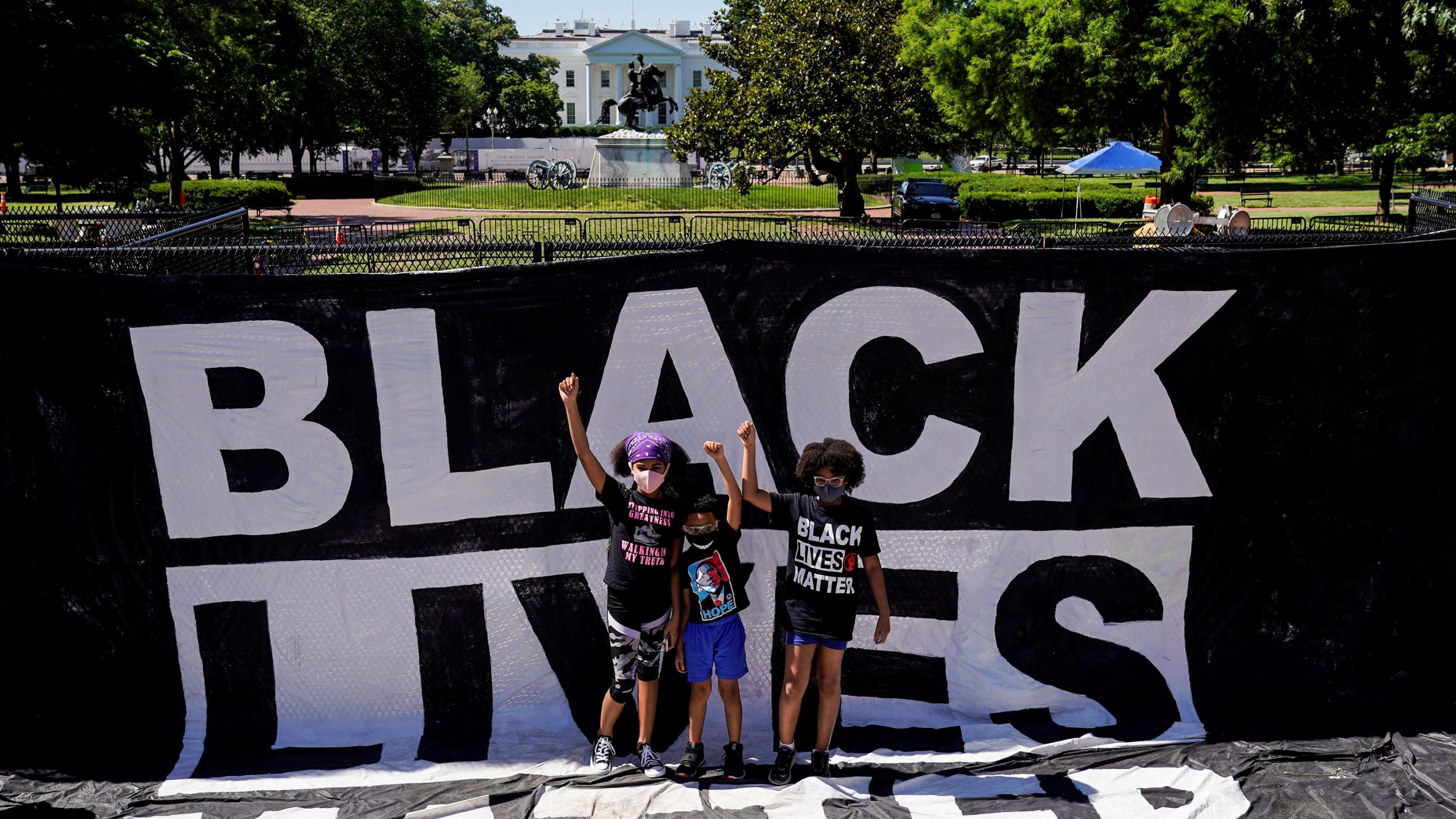
At that place are racist burdens to bear as the pandemic unfolds too, the authors write. Shown here is a grouping of children in front of a Blackness Lives Affair sign in Washington, DC, on June seven, 2020. REUTERS/Joshua Roberts
There are racist burdens to bear every bit the pandemic unfolds likewise. The United States has witnessed increased hostility toward certain immigrant groups in the last vi months. The mistreatment and exploitation of Central American and Mexican immigrants at the southern border and derogatory language toward Chinese Americans regarding the virus' origin in China reflect these anti-immigrant sentiments.
Many immigrants rely on i some other for social support
Social isolation has also worsened mental wellness in immigrant communities. Many immigrants rely on one another for social support. Physical distancing measures designed to curb the outbreak prevent individuals from engaging in person. Moreover, bereft wellness illiteracy in immigrant populations can result in fears regarding needed social services and health care. Individuals worry near the public accuse rule, which says that seeking certain public benefits can disqualify an immigrant from securing a visa, and they may be unsure about permitted supports and potential obstacles to securing permanent condition in the United states.
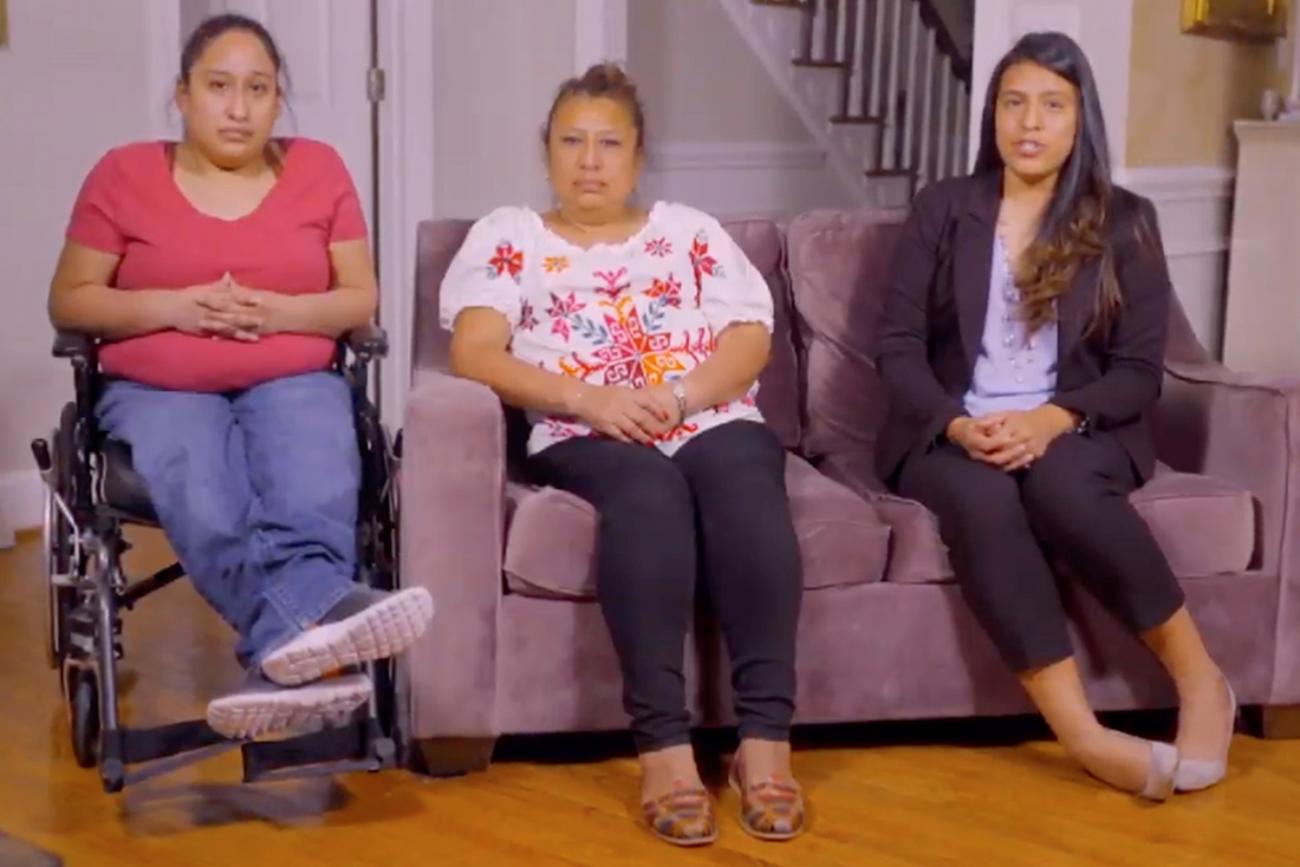
Silvia Sanchez, an undocumented immigrant in Due north Carolina, with her daughters Jessica and Lucy, speaks by video feed during the virtual 2020 Democratic National Convention on August 19, 2020. REUTERS/Pool
Where Do Nosotros Go From Hither?
Addressing the mental wellness of children of immigrants demands a multifaceted arroyo. Culturally competent, thoughtful initiatives can rectify social inequities through expanded access to wellness care, engagement with immigrant communities, and germination of support networks. Understanding why the linkages to care are often broken is a good place to outset.
Children of immigrants often do not seek health treat a variety of reasons. Cost alone can be an insurmountable bulwark such that care is but sought in situations of extreme crisis. A wider safety net system would address the prohibitive nature of insurance for equitable physical and mental health intendance.
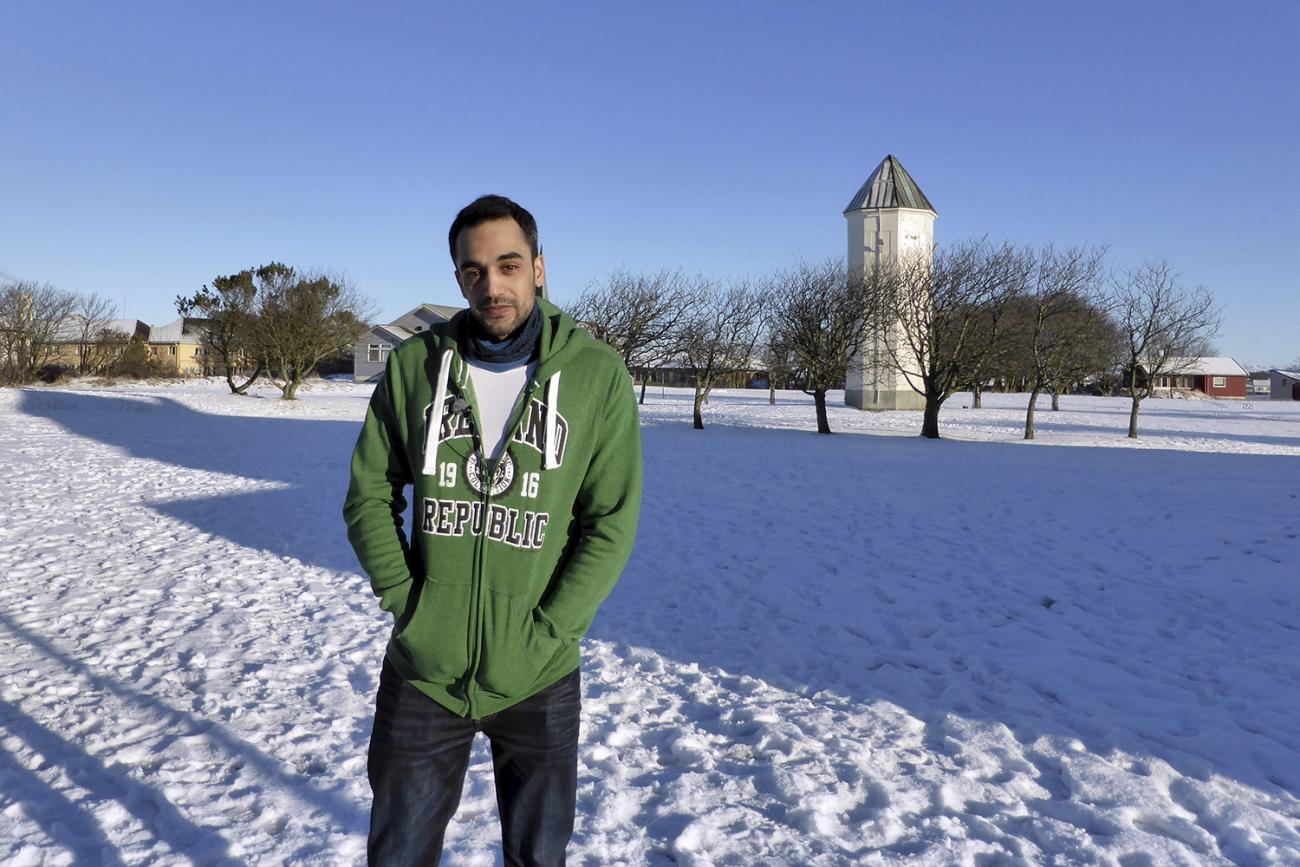
Norway does some things well. Here a Syrian commercial airline pilot named Muaz—in Naerboe, Norway, on January 19, 2016—at a workshop that treats attendees as futurity members of Norwegian society. REUTERS/Gwladys Fouche
It'southward worth looking at other countries to find best practices and potential challenges in addressing the needs of immigrants and their children. In Norway , immigrants can receive assistance with securing employment from a designated government worker, alleviating stress for the children and promoting the parents' fiscal stability.
This estrangement from peers and families further exacerbates the trauma of migration, racism, and xenophobia
Some countries offer gratis linguistic communication classes in both the language of the state and the various mother tongues of immigrants, improving communication within families and encouraging parental self-reliance. Some countries have poor practices that may exist worth avoiding. Kingdom of denmark's assimilationist model , for instance, fails to support immigrants for who they are, forcing integration into the existing culture through mandatory specialized education on "Danish" values. In Denmark, the children of immigrants are required to attend separate language classes and receive education on Christian traditions. By separating children of immigrants from their peers and choosing to not reciprocate an agreement of faiths and cultures, the Danish government effectively denies Danish-children of immigrants both their familial and national identities by establishing a state of existence between paradoxical sites of identification and alienation. This estrangement from peers and families further exacerbates the trauma of migration, racism, and xenophobia.

People participate in a torchlight procession to show their support for migrants and refugees after the Danish government tightened rules for asylum seekers in Copenhagen, Denmar, on October half dozen, 2015. REUTERS/Soeren Bidstrup/Scanpix Denmark
Cultural competency is crucial for creating new initiatives to address the unique mental health challenges that children of immigrants face, and this suggests one approach is to partner with institutions that are already sensitive to the needs of particular immigrant communities—like schools or religious organizations.
Children of immigrants are America's hereafter—we should promote their health through comprehensive, attainable, and respectful initiatives
But that'southward non plenty. Mental wellness professionals also need culturally competent grooming on the unique circumstances of children of immigrants and how to help them know how and where to seek back up. Networks of support for these children can foster trust and resilience in this population. Such networks may appear naturally, merely formal structures could support children of immigrants isolated due to geographic constraints or informal gatekeeping mechanisms such equally linguistic power, age, or financial resource. Children of immigrants are America's future. We should promote their health through comprehensive, accessible, and respectful initiatives to run across their unique needs.
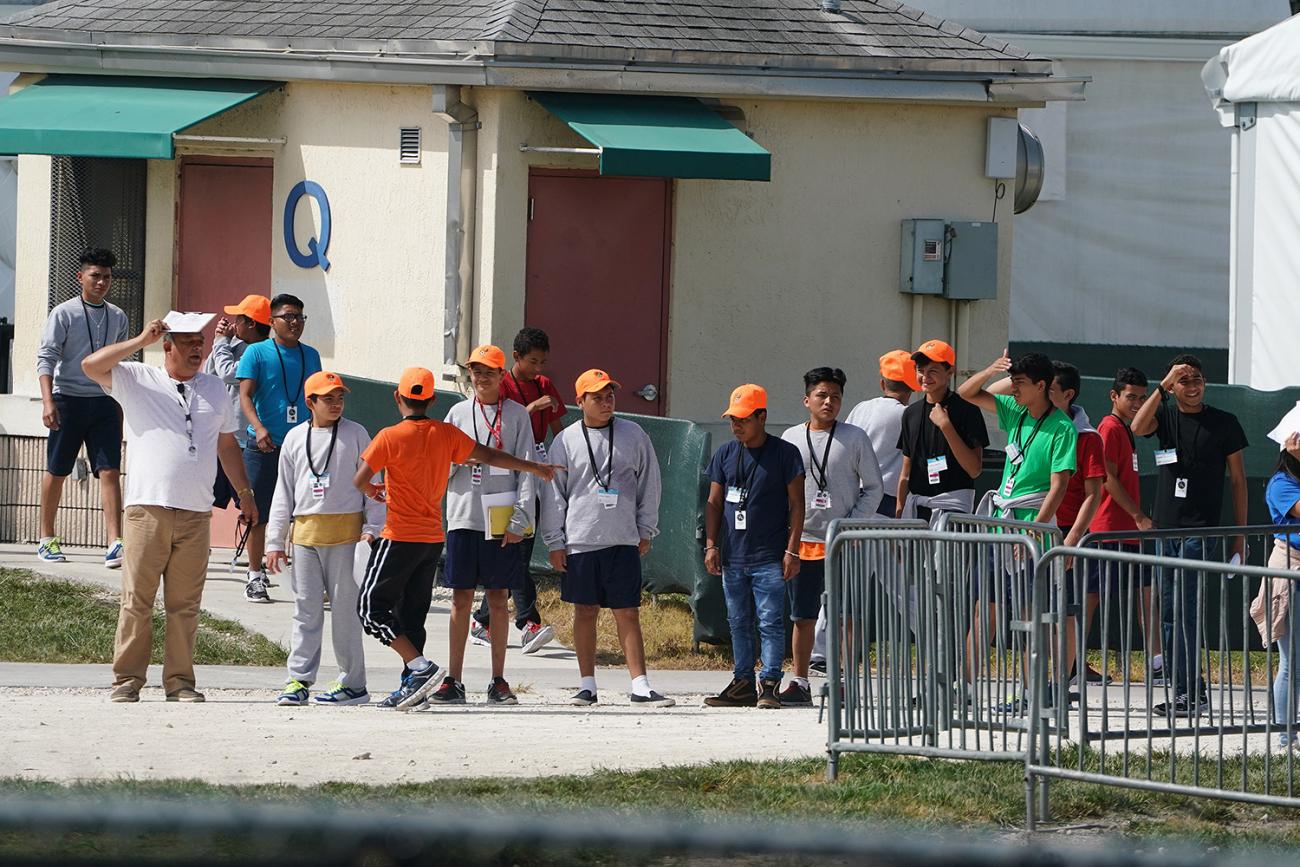
Children of immigrants are America's hereafter, the authors write. Here children who have been incarcerated by Homeland Security are housed in tents in Homestead, Florida, U.S., June 26, 2019. REUTERS/Carlo Allegri
In doing and so, we non only serve the needs of individuals in our society, we also foster a more productive, stronger, and healthier nation—one supported, as it ever has been, on the difficult piece of work and resiliency of immigrants.
Source: https://www.thinkglobalhealth.org/article/children-immigrants-and-their-mental-health-needs
0 Response to "what the inmigrants need to be health under strees"
Post a Comment